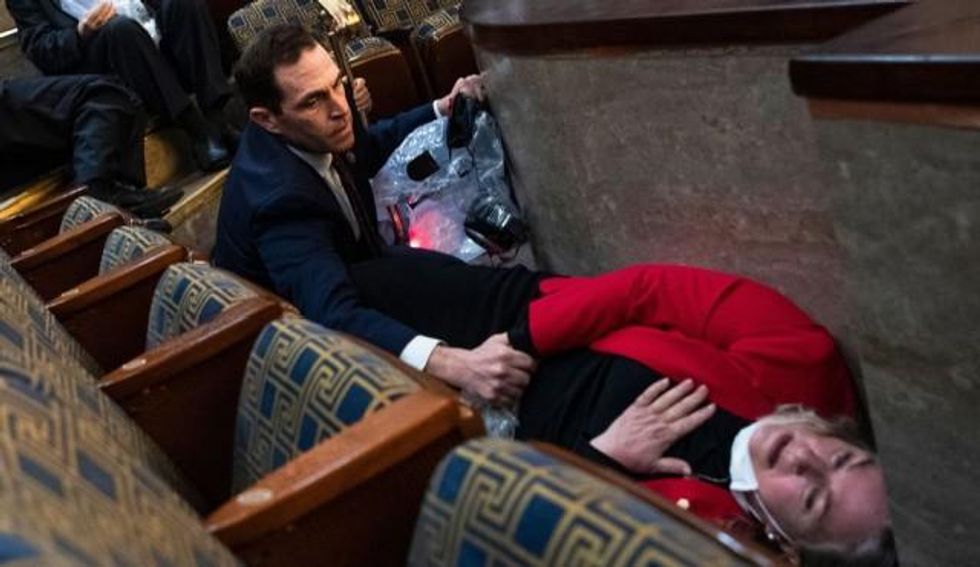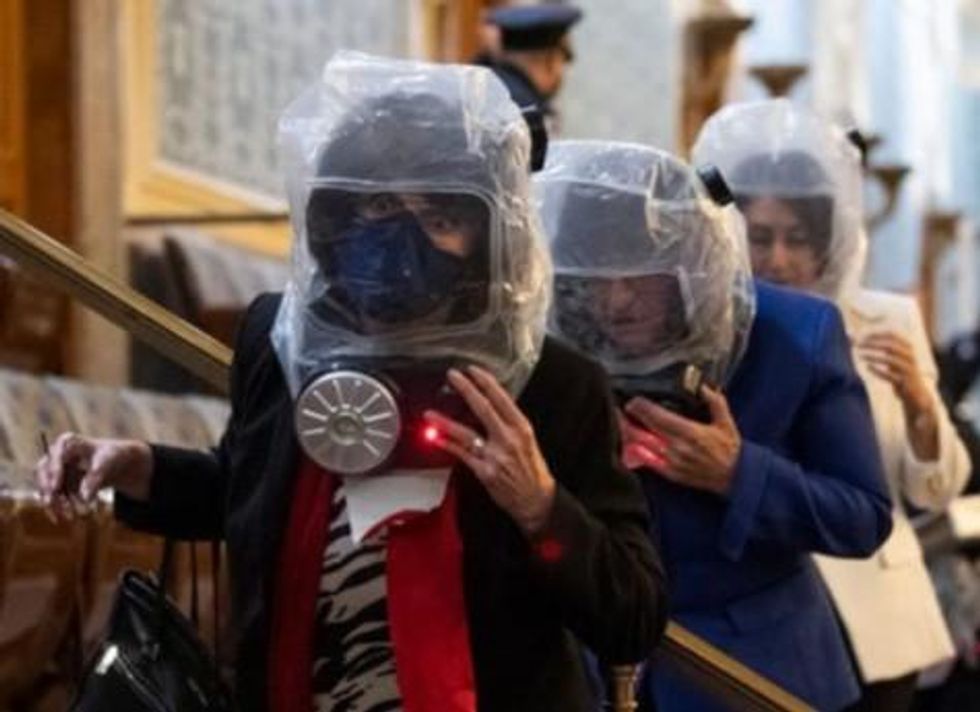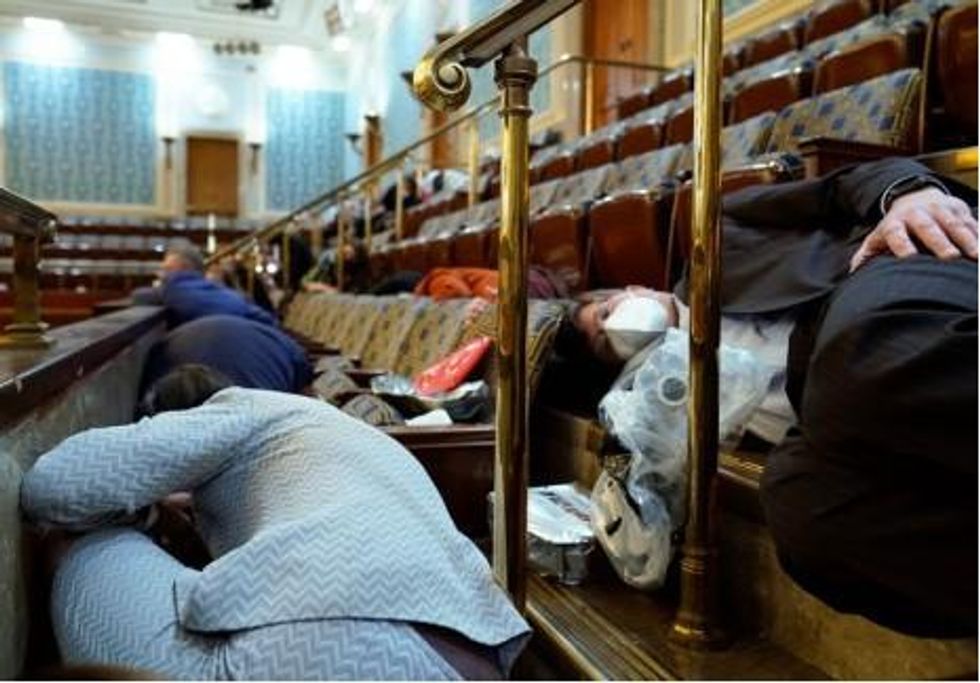

SUBSCRIBE TO OUR FREE NEWSLETTER
Daily news & progressive opinion—funded by the people, not the corporations—delivered straight to your inbox.
5
#000000
#FFFFFF
To donate by check, phone, or other method, see our More Ways to Give page.


Daily news & progressive opinion—funded by the people, not the corporations—delivered straight to your inbox.
Facing a Trump trial that could put their collusion with domestic terrorists on record, a craven GOP is frantically downplaying the mayhem they unleashed and deriding those seeking accountability - most visibly AOC, now the target of a smear campaign by yahoos telling her "to go fornicate yourself." But the nasty sound and fury doesn't change the truth: Lawmakers and staff are traumatized, Capitol police are still "reeling," and since the riot two of their own have killed themselves.

Colorado Rep. Jason Crow, a former Army ranger who saw combat, comforts Pennsylvania Rep. Susan Wild as they were trapped in the House Chamber. Photo by Tom Williams/Getty
Facing a Trump impeachment trial that could put their collusion with domestic terrorists on record, a craven, and ever-hypocritical GOP is frantically backpedaling on history, downplaying the mayhem they unleashed, declaring themselves innocent of wrongdoing, blithely insisting it's time to "move on" and for good measure deriding those insisting on the facts and the need for accountability - thus following a long national tradition of willful denial that led writer Gore Vidal to proclaim us "the United States of Amnesia." In truth, the damage from the Capitol riot - and the "insurgents" the FBI is still tracking - runs deep and wide. On Thursday, several lawmakers spoke out in the House about the panic they felt that day, the ongoing trauma it engendered, and the rage they still must struggle with. Said Missouri Rep. Cori Bush, a former social justice advocate, "This was like one of the days out there when the white supremacists would show up and start shooting at us." Among the most visible of those speaking up has been New York Rep. Alexandria Ocasio-Cortez. In a 98-minute video this week, she described her fear as she hid with Rep. Katie Porter - especially, AOC revealed, as a sexual assault survivor - and called out complicit GOPers who "continue to be a danger to their colleagues."
As a longtime target of right-wing vitriol and so many death threats her staff grows uneasy when a stranger appears at the office, AOC has keenly felt that danger. One of the rioters has been arrested for threatening to assassinate her; his lawyer says he's now trying to "de-program" his client from Trump, who he calls "a cult leader." Still, AOC determinedly argues, "We cannot heal without accountability" for those who "chose to tell the lie." For her bravery, she's become the target of a nasty smear campaign - classic abuser move - by right-wing pols and media: She's "a petulant child" and a la Jussie Smollett the country should "unify in telling you to go fornicate yourself," her account was a "loopy delusion" of "amazing acting" and "gross manipulation," she wasn't even in the building, and from Glenn Greenwald (yes, that one), she didn't have "even a tiny little bruise on her body," though damn you'd think he'd know about the long history of women needing to show bruises to prove they were harmed. The vicious clap back prompted several outraged pieces - here, here, here - about the indignities visited upon women who speak out. The gist, from one: "I am so fucking sick of men telling women they didn't experience what they experienced."
At the heart of the bedlam, that day were hundreds of ill-prepared Capitol police suddenly "engaged in literal hand-to-hand combat" against a frenzied mob wielding everything from crutches, flagpoles and cross-bows to stun guns, Molotov cocktails and multiple firearms, including rifles with armor-piercing bullets. Due to a still-murky mix of incompetence and complicity, they remained largely, stunningly without back-up, in part thanks to passive Army officials who admitted they "didn't like the optics of boots on the ground at the Capitol." In closed-door remarks, titled "Capitol Complex Security Failures," before the House last week, Acting Metropolitan Police Chief Robert Contee called the assault "a dark day for our country" that had "exposed weaknesses in the security of the most secure city in the country." In a chilling narrative, he described "officers being beaten by a crowd of insurgents" in hours-long combat "indelibly etched" on officers' memories - and their bodies. About 140 officers were injured - cracked ribs, traumatic brain injuries, smashed spinal discs, a lost eye, many scratches, bruises, cuts, mace-burned eyes. His clear, grim conclusion: Police, the Capitol, the electoral process was under attack. "This was not a peaceful protest, (but) an assault on our democracy," he said. "The costs for this insurrection - both human and monetary - will be steep." And they have been.
There were five deaths: four rioters, and officer Brian Sicknick, whose remains lay in honor this week at the Rotunda; he died after getting hit in the head with a fire extinguisher. At a brief ceremony, Nancy Pelosi lamented the "senseless tragedy" of his death; a superior noted there's "nothing more traumatic" to police than a colleague's death. Far more of that trauma, Chief Contee warns, "will be widely felt but possibly unacknowledged." He says he's working to address the mental health issues of officers, but the force has been "reeling" from two suicides of officers in the wake of the riot. Howard Liebengood, 51, who had guarded the Capitol for 15 years, took his life Jan. 9, and Jeffrey Smith, 35, a 12-year veteran, killed himself Jan. 15. Those deaths and all that sparked them has reportedly left a department in turmoil, with plummeting morale and widespread fear, guilt, uncertainty and anger at higher-ups that many officers feel failed them. "We're coming to work for the next person we work with," said one. "(We) try to take care of each other." That's also what drove officer Michael Fanone, 40, who's worked plainclothes for a decade and never taken his riot gear out of its plastic bag, to leave his desk and self-deploy the day of the riot: "I went there for my brothers and sisters in law enforcement." He ended up getting beaten, tased, dragged down stairs, and pummeled smashed with an American flag by a half-dozen rioters yelling, "Kill him with own gun." After he begged them to let him live for his four daughters, they released him; he later had a heart attack. He likely spoke for thousands in D.C. that day in his response to their moment of mercy: "Thank you, but fuck you for being there."


Gas-masked lawmakers exit the Chamber. Getty Image

Lawmakers huddle. Photo by Andrew Harnik/AP

Fox goes lower still
Dear Common Dreams reader, The U.S. is on a fast track to authoritarianism like nothing I've ever seen. Meanwhile, corporate news outlets are utterly capitulating to Trump, twisting their coverage to avoid drawing his ire while lining up to stuff cash in his pockets. That's why I believe that Common Dreams is doing the best and most consequential reporting that we've ever done. Our small but mighty team is a progressive reporting powerhouse, covering the news every day that the corporate media never will. Our mission has always been simple: To inform. To inspire. And to ignite change for the common good. Now here's the key piece that I want all our readers to understand: None of this would be possible without your financial support. That's not just some fundraising cliche. It's the absolute and literal truth. We don't accept corporate advertising and never will. We don't have a paywall because we don't think people should be blocked from critical news based on their ability to pay. Everything we do is funded by the donations of readers like you. Will you donate now to help power the nonprofit, independent reporting of Common Dreams? Thank you for being a vital member of our community. Together, we can keep independent journalism alive when it’s needed most. - Craig Brown, Co-founder |

Colorado Rep. Jason Crow, a former Army ranger who saw combat, comforts Pennsylvania Rep. Susan Wild as they were trapped in the House Chamber. Photo by Tom Williams/Getty
Facing a Trump impeachment trial that could put their collusion with domestic terrorists on record, a craven, and ever-hypocritical GOP is frantically backpedaling on history, downplaying the mayhem they unleashed, declaring themselves innocent of wrongdoing, blithely insisting it's time to "move on" and for good measure deriding those insisting on the facts and the need for accountability - thus following a long national tradition of willful denial that led writer Gore Vidal to proclaim us "the United States of Amnesia." In truth, the damage from the Capitol riot - and the "insurgents" the FBI is still tracking - runs deep and wide. On Thursday, several lawmakers spoke out in the House about the panic they felt that day, the ongoing trauma it engendered, and the rage they still must struggle with. Said Missouri Rep. Cori Bush, a former social justice advocate, "This was like one of the days out there when the white supremacists would show up and start shooting at us." Among the most visible of those speaking up has been New York Rep. Alexandria Ocasio-Cortez. In a 98-minute video this week, she described her fear as she hid with Rep. Katie Porter - especially, AOC revealed, as a sexual assault survivor - and called out complicit GOPers who "continue to be a danger to their colleagues."
As a longtime target of right-wing vitriol and so many death threats her staff grows uneasy when a stranger appears at the office, AOC has keenly felt that danger. One of the rioters has been arrested for threatening to assassinate her; his lawyer says he's now trying to "de-program" his client from Trump, who he calls "a cult leader." Still, AOC determinedly argues, "We cannot heal without accountability" for those who "chose to tell the lie." For her bravery, she's become the target of a nasty smear campaign - classic abuser move - by right-wing pols and media: She's "a petulant child" and a la Jussie Smollett the country should "unify in telling you to go fornicate yourself," her account was a "loopy delusion" of "amazing acting" and "gross manipulation," she wasn't even in the building, and from Glenn Greenwald (yes, that one), she didn't have "even a tiny little bruise on her body," though damn you'd think he'd know about the long history of women needing to show bruises to prove they were harmed. The vicious clap back prompted several outraged pieces - here, here, here - about the indignities visited upon women who speak out. The gist, from one: "I am so fucking sick of men telling women they didn't experience what they experienced."
At the heart of the bedlam, that day were hundreds of ill-prepared Capitol police suddenly "engaged in literal hand-to-hand combat" against a frenzied mob wielding everything from crutches, flagpoles and cross-bows to stun guns, Molotov cocktails and multiple firearms, including rifles with armor-piercing bullets. Due to a still-murky mix of incompetence and complicity, they remained largely, stunningly without back-up, in part thanks to passive Army officials who admitted they "didn't like the optics of boots on the ground at the Capitol." In closed-door remarks, titled "Capitol Complex Security Failures," before the House last week, Acting Metropolitan Police Chief Robert Contee called the assault "a dark day for our country" that had "exposed weaknesses in the security of the most secure city in the country." In a chilling narrative, he described "officers being beaten by a crowd of insurgents" in hours-long combat "indelibly etched" on officers' memories - and their bodies. About 140 officers were injured - cracked ribs, traumatic brain injuries, smashed spinal discs, a lost eye, many scratches, bruises, cuts, mace-burned eyes. His clear, grim conclusion: Police, the Capitol, the electoral process was under attack. "This was not a peaceful protest, (but) an assault on our democracy," he said. "The costs for this insurrection - both human and monetary - will be steep." And they have been.
There were five deaths: four rioters, and officer Brian Sicknick, whose remains lay in honor this week at the Rotunda; he died after getting hit in the head with a fire extinguisher. At a brief ceremony, Nancy Pelosi lamented the "senseless tragedy" of his death; a superior noted there's "nothing more traumatic" to police than a colleague's death. Far more of that trauma, Chief Contee warns, "will be widely felt but possibly unacknowledged." He says he's working to address the mental health issues of officers, but the force has been "reeling" from two suicides of officers in the wake of the riot. Howard Liebengood, 51, who had guarded the Capitol for 15 years, took his life Jan. 9, and Jeffrey Smith, 35, a 12-year veteran, killed himself Jan. 15. Those deaths and all that sparked them has reportedly left a department in turmoil, with plummeting morale and widespread fear, guilt, uncertainty and anger at higher-ups that many officers feel failed them. "We're coming to work for the next person we work with," said one. "(We) try to take care of each other." That's also what drove officer Michael Fanone, 40, who's worked plainclothes for a decade and never taken his riot gear out of its plastic bag, to leave his desk and self-deploy the day of the riot: "I went there for my brothers and sisters in law enforcement." He ended up getting beaten, tased, dragged down stairs, and pummeled smashed with an American flag by a half-dozen rioters yelling, "Kill him with own gun." After he begged them to let him live for his four daughters, they released him; he later had a heart attack. He likely spoke for thousands in D.C. that day in his response to their moment of mercy: "Thank you, but fuck you for being there."


Gas-masked lawmakers exit the Chamber. Getty Image

Lawmakers huddle. Photo by Andrew Harnik/AP

Fox goes lower still

Colorado Rep. Jason Crow, a former Army ranger who saw combat, comforts Pennsylvania Rep. Susan Wild as they were trapped in the House Chamber. Photo by Tom Williams/Getty
Facing a Trump impeachment trial that could put their collusion with domestic terrorists on record, a craven, and ever-hypocritical GOP is frantically backpedaling on history, downplaying the mayhem they unleashed, declaring themselves innocent of wrongdoing, blithely insisting it's time to "move on" and for good measure deriding those insisting on the facts and the need for accountability - thus following a long national tradition of willful denial that led writer Gore Vidal to proclaim us "the United States of Amnesia." In truth, the damage from the Capitol riot - and the "insurgents" the FBI is still tracking - runs deep and wide. On Thursday, several lawmakers spoke out in the House about the panic they felt that day, the ongoing trauma it engendered, and the rage they still must struggle with. Said Missouri Rep. Cori Bush, a former social justice advocate, "This was like one of the days out there when the white supremacists would show up and start shooting at us." Among the most visible of those speaking up has been New York Rep. Alexandria Ocasio-Cortez. In a 98-minute video this week, she described her fear as she hid with Rep. Katie Porter - especially, AOC revealed, as a sexual assault survivor - and called out complicit GOPers who "continue to be a danger to their colleagues."
As a longtime target of right-wing vitriol and so many death threats her staff grows uneasy when a stranger appears at the office, AOC has keenly felt that danger. One of the rioters has been arrested for threatening to assassinate her; his lawyer says he's now trying to "de-program" his client from Trump, who he calls "a cult leader." Still, AOC determinedly argues, "We cannot heal without accountability" for those who "chose to tell the lie." For her bravery, she's become the target of a nasty smear campaign - classic abuser move - by right-wing pols and media: She's "a petulant child" and a la Jussie Smollett the country should "unify in telling you to go fornicate yourself," her account was a "loopy delusion" of "amazing acting" and "gross manipulation," she wasn't even in the building, and from Glenn Greenwald (yes, that one), she didn't have "even a tiny little bruise on her body," though damn you'd think he'd know about the long history of women needing to show bruises to prove they were harmed. The vicious clap back prompted several outraged pieces - here, here, here - about the indignities visited upon women who speak out. The gist, from one: "I am so fucking sick of men telling women they didn't experience what they experienced."
At the heart of the bedlam, that day were hundreds of ill-prepared Capitol police suddenly "engaged in literal hand-to-hand combat" against a frenzied mob wielding everything from crutches, flagpoles and cross-bows to stun guns, Molotov cocktails and multiple firearms, including rifles with armor-piercing bullets. Due to a still-murky mix of incompetence and complicity, they remained largely, stunningly without back-up, in part thanks to passive Army officials who admitted they "didn't like the optics of boots on the ground at the Capitol." In closed-door remarks, titled "Capitol Complex Security Failures," before the House last week, Acting Metropolitan Police Chief Robert Contee called the assault "a dark day for our country" that had "exposed weaknesses in the security of the most secure city in the country." In a chilling narrative, he described "officers being beaten by a crowd of insurgents" in hours-long combat "indelibly etched" on officers' memories - and their bodies. About 140 officers were injured - cracked ribs, traumatic brain injuries, smashed spinal discs, a lost eye, many scratches, bruises, cuts, mace-burned eyes. His clear, grim conclusion: Police, the Capitol, the electoral process was under attack. "This was not a peaceful protest, (but) an assault on our democracy," he said. "The costs for this insurrection - both human and monetary - will be steep." And they have been.
There were five deaths: four rioters, and officer Brian Sicknick, whose remains lay in honor this week at the Rotunda; he died after getting hit in the head with a fire extinguisher. At a brief ceremony, Nancy Pelosi lamented the "senseless tragedy" of his death; a superior noted there's "nothing more traumatic" to police than a colleague's death. Far more of that trauma, Chief Contee warns, "will be widely felt but possibly unacknowledged." He says he's working to address the mental health issues of officers, but the force has been "reeling" from two suicides of officers in the wake of the riot. Howard Liebengood, 51, who had guarded the Capitol for 15 years, took his life Jan. 9, and Jeffrey Smith, 35, a 12-year veteran, killed himself Jan. 15. Those deaths and all that sparked them has reportedly left a department in turmoil, with plummeting morale and widespread fear, guilt, uncertainty and anger at higher-ups that many officers feel failed them. "We're coming to work for the next person we work with," said one. "(We) try to take care of each other." That's also what drove officer Michael Fanone, 40, who's worked plainclothes for a decade and never taken his riot gear out of its plastic bag, to leave his desk and self-deploy the day of the riot: "I went there for my brothers and sisters in law enforcement." He ended up getting beaten, tased, dragged down stairs, and pummeled smashed with an American flag by a half-dozen rioters yelling, "Kill him with own gun." After he begged them to let him live for his four daughters, they released him; he later had a heart attack. He likely spoke for thousands in D.C. that day in his response to their moment of mercy: "Thank you, but fuck you for being there."


Gas-masked lawmakers exit the Chamber. Getty Image

Lawmakers huddle. Photo by Andrew Harnik/AP

Fox goes lower still